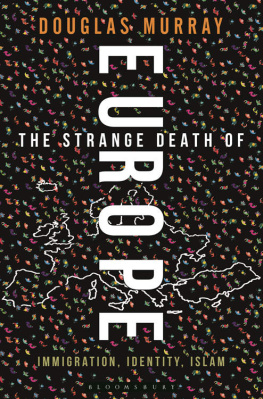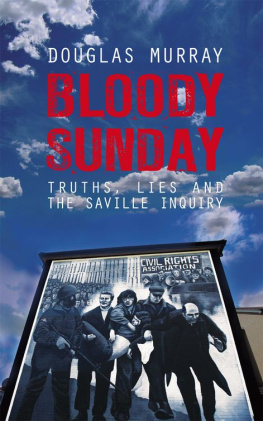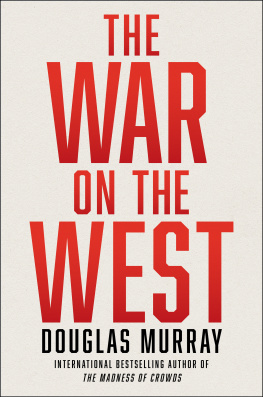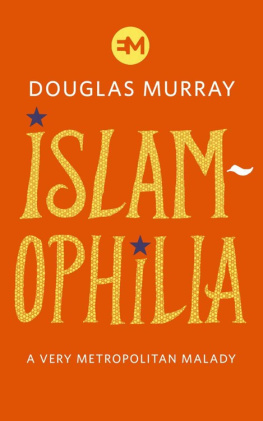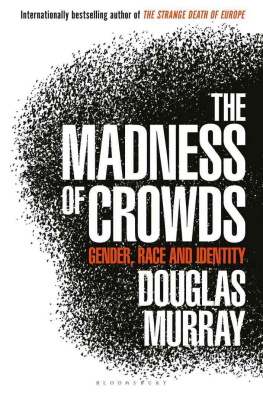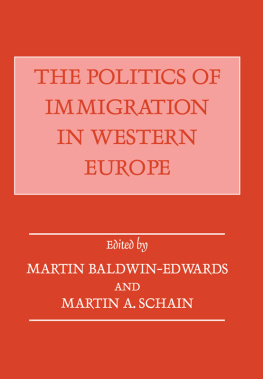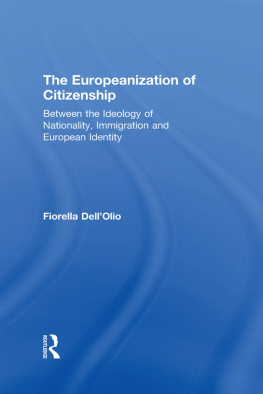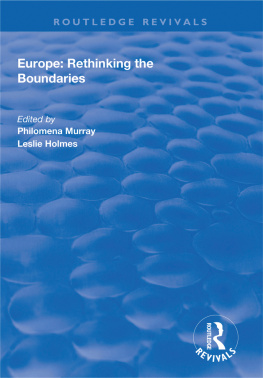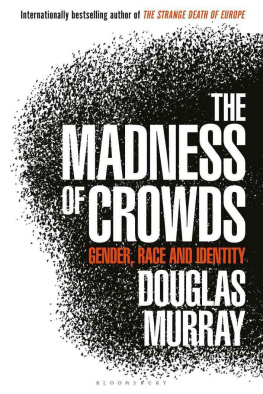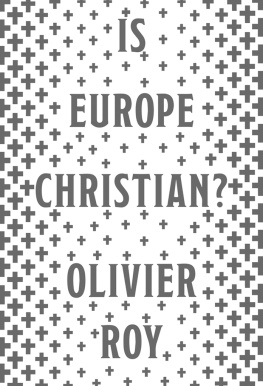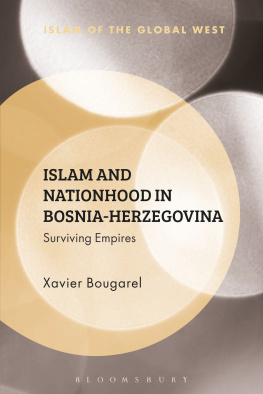Douglas Murray - The Strange Death of Europe: Immigration, Identity, Islam
Here you can read online Douglas Murray - The Strange Death of Europe: Immigration, Identity, Islam full text of the book (entire story) in english for free. Download pdf and epub, get meaning, cover and reviews about this ebook. year: 2017, publisher: Bloomsbury, genre: Science. Description of the work, (preface) as well as reviews are available. Best literature library LitArk.com created for fans of good reading and offers a wide selection of genres:
Romance novel
Science fiction
Adventure
Detective
Science
History
Home and family
Prose
Art
Politics
Computer
Non-fiction
Religion
Business
Children
Humor
Choose a favorite category and find really read worthwhile books. Enjoy immersion in the world of imagination, feel the emotions of the characters or learn something new for yourself, make an fascinating discovery.
- Book:The Strange Death of Europe: Immigration, Identity, Islam
- Author:
- Publisher:Bloomsbury
- Genre:
- Year:2017
- Rating:3 / 5
- Favourites:Add to favourites
- Your mark:
- 60
- 1
- 2
- 3
- 4
- 5
The Strange Death of Europe: Immigration, Identity, Islam: summary, description and annotation
We offer to read an annotation, description, summary or preface (depends on what the author of the book "The Strange Death of Europe: Immigration, Identity, Islam" wrote himself). If you haven't found the necessary information about the book — write in the comments, we will try to find it.
The Strange Death of Europe: Immigration, Identity, Islam — read online for free the complete book (whole text) full work
Below is the text of the book, divided by pages. System saving the place of the last page read, allows you to conveniently read the book "The Strange Death of Europe: Immigration, Identity, Islam" online for free, without having to search again every time where you left off. Put a bookmark, and you can go to the page where you finished reading at any time.
Font size:
Interval:
Bookmark:
THE STRANGE DEATH
OF EUROPE
THE STRANGE DEATH
OF EUROPE
Immigration, Identity, Islam
DOUGLAS MURRAY

CONTENTS
Europe is committing suicide. Or at least its leaders have decided to commit suicide. Whether the European people choose to go along with this is, naturally, another matter.
When I say that Europe is in the process of killing itself I do not mean that the burden of European Commission regulation has become overbearing or that the European Convention on Human Rights has not done enough to satisfy the demands of a particular community. I mean that the civilisation we know as Europe is in the process of committing suicide and that neither Britain nor any other Western European country can avoid that fate because we all appear to suffer from the same symptoms and maladies. As a result, by the end of the lifespans of most people currently alive Europe will not be Europe and the peoples of Europe will have lost the only place in the world we had to call home.
It may be pointed out that proclamations of Europes demise have been a staple throughout our history and that Europe would not be Europe without regular predictions of our mortality. Yet some have been more persuasively timed than others. In Die Welt von Gestern (The World of Yesterday), first published in 1942, Stefan Zweig wrote of his continent in the years leading up to the Second World War, I felt that Europe, in its state of derangement, had passed its own death sentence our sacred home of Europe, both the cradle and the Parthenon of Western civilisation.
One of the few things that gave Zweig any hope even then was that in the countries of South America to which he had finally fled he saw offshoots of his own culture. In Argentina and Brazil he witnessed how a culture can emigrate from one land to another so that even if the tree that gave the culture life has died it can still provide new blossom and new fruit. Even had Europe at that moment destroyed
Today, largely because of the catastrophe Zweig described, the tree of Europe is finally lost. Europe today has little desire to reproduce itself, fight for itself or even take its own side in an argument. Those in power seem persuaded that it would not matter if the people and culture of Europe were lost to the world. Some have clearly decided (as Bertolt Brecht wrote in his 1953 poem The Solution) to dissolve the people and elect another because, as a recent Swedish conservative Prime Minister Fredrik Reinfeldt put it, only barbarism comes from countries like his whereas only good things come from outside.
There is no single cause of the present sickness. The culture produced by the tributaries of Judaeo-Christian culture, the Ancient Greeks and Romans, and the discoveries of the Enlightenment has not been levelled by nothing. But the final act has come about because of two simultaneous concatenations from which it is now all but impossible to recover.
The first is the mass movement of peoples into Europe. In all Western European countries this process began after the Second World War due to labour shortages. Soon Europe got hooked on the migration and could not stop the flow even if it had wanted to. The result was that what had been Europe the home of the European peoples gradually became a home for the entire world. The places that had been European gradually became somewhere else. So places dominated by Pakistani immigrants resembled Pakistan in everything but their location, with the recent arrivals and their children eating the food of their place of origin, speaking the language of their place of origin and worshipping the religion of their place of origin. Streets in the cold and rainy northern towns of Europe filled with people dressed for the foothills of Pakistan or the sandstorms of Arabia. The Empire strikes back noted some observers with a barely concealed smirk. Yet whereas the empires of Europe had been thrown off, these new colonies were obviously intended to be for good.
All the time Europeans found ways to pretend this could work. By insisting, for instance, that such immigration was normal. Or that if integration did not happen with the first generation then it might happen with their children, grandchildren or another generation yet to come. Or that it didnt matter whether people integrated or not. All the time we waved away the greater likelihood that it just wouldnt work. This is a conclusion that the migration crisis of recent years has simply accelerated.
Which brings me to the second concatenation. For even the mass movement of millions of people into Europe would not sound such a final note for the continent were it not for the fact that (coincidentally or otherwise) at the same time Europe lost faith in its beliefs, traditions and legitimacy. Countless factors have contributed to this development, but one is the way in which Western Europeans have lost what the Spanish philosopher Miguel de Unamuno famously called the tragic sense of life. They have forgotten what Zweig and his generation so painfully learnt: that everything you love, even the greatest and most cultured civilisations in history, can be swept away by people who are unworthy of them. Other than simply ignoring it, one of the few ways to avoid this tragic sense of life is to push it away through a belief in the tide of human progress. That tactic remains for the time being the most popular approach.
Yet all the time we skate over, and sometimes fall into, terrible doubts of our own creation. More than any other continent or culture in the world today, Europe is now deeply weighed down with guilt for its past. Alongside this outgoing version of self-distrust runs a more introverted version of the same guilt. For there is also the problem in Europe of an existential tiredness and a feeling that perhaps for Europe the story has run out and a new story must be allowed to begin. Mass immigration the replacement of large parts of the European populations by other people is one way in which this new story has been imagined: a change, we seemed to think, was as good as a rest. Such existential civilisational tiredness is not a uniquely modern European phenomenon, but the fact that a society should feel like it has run out of steam at precisely the moment when a new society has begun to move in cannot help but lead to vast, epochal changes.
In fact the criticism, thought and discussion ought to have been boundless. Looking back, it is remarkable how restricted we made our discussion even whilst we opened our home to the world. A thousand years ago the peoples of Genoa and Florence were not as intermingled as they now are, but today they are all recognisably Italian and tribal differences have tended to lessen rather than grow with time. The current thinking appears to be that at some stage in the years ahead the peoples of Eritrea and Afghanistan too will be intermingled within Europe as the Genoans and Florentines are now melded into Italy. The skin colour of individuals from Eritrea and Afghanistan may be different, their ethnic origins may be from further afield, but Europe will still be Europe and its people will continue to mingle in the spirit of Voltaire and St Paul, Dante, Goethe and Bach.
As with so many popular delusions there is something in this. The nature of Europe has always shifted and as trading cities like Venice show has included a grand and uncommon receptiveness to foreign ideas and influence. From the Ancient Greeks and Romans onwards the peoples of Europe sent out ships to scour the world and report back on what they found. Rarely, if ever, did the rest of the world return their curiosity in kind, but nevertheless the ships went out and returned with tales and discoveries that melded into the air of Europe. The receptivity was prodigious: it was not, however, boundless.
Next pageFont size:
Interval:
Bookmark:
Similar books «The Strange Death of Europe: Immigration, Identity, Islam»
Look at similar books to The Strange Death of Europe: Immigration, Identity, Islam. We have selected literature similar in name and meaning in the hope of providing readers with more options to find new, interesting, not yet read works.
Discussion, reviews of the book The Strange Death of Europe: Immigration, Identity, Islam and just readers' own opinions. Leave your comments, write what you think about the work, its meaning or the main characters. Specify what exactly you liked and what you didn't like, and why you think so.

